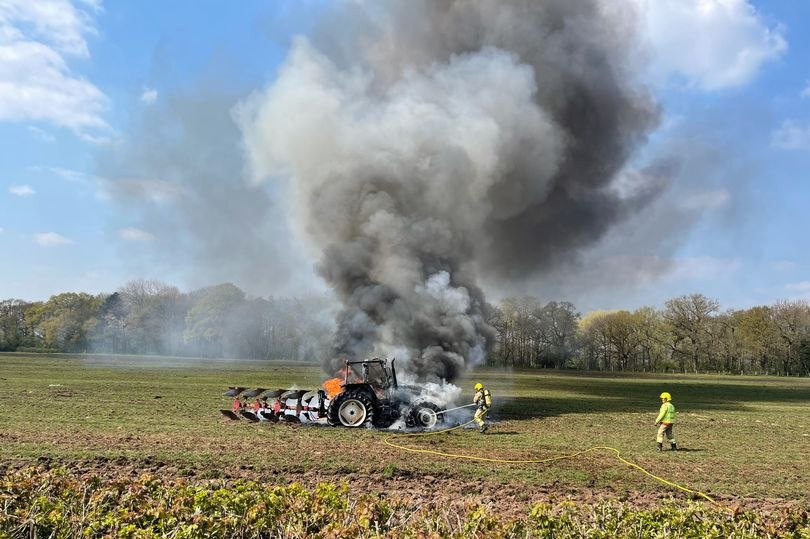Firefighters tackle tractor fire on Cheshire farm

A dramatic image has emerged of firefighters tackling a tractor fire which happened on a Cheshire farm over the weekend.
Firefighters were called to the blaze on Saturday 17 April, on land off Puddington Lane, Neston.
On arrival the crews found one tractor 'well alight' in a field.
A statement from the Cheshire Fire and Rescue Service said: "Two fire engines attended - one from Powey Lane and one from Ellesmere Port.
"A firefighter wearing breathing apparatus used one hose reel jet to extinguish the flames.
"The crews then checked the area for hot spots."
It comes as recent research revealed that electrical accessory wiring is one of the main reasons behind the increase in tractor fires seen on farms.
NFU Mutual examined the causes of almost 1,000 tractor fires after the insurer paid out nearly £19m in claims in 2019 due to these incidents.
A common factor in a number of fires in modern tractors was electrical accessories wired directly to the tractor battery cables.
Bob Henderson, technical engineering manager for NFU Mutual, said that over the last few years, the number of tractor fires had shot up.
"This is putting lives of people and livestock at risk as well as leading to expensive damage and disruption of farming activities," he added.
“It’s often very tricky to find the exact cause of tractor fires because the intense heat makes forensic examination difficult.
“Traditionally accidental tractor fires have been attributed to overheating bearings and other moving parts starting fires – or chafed wiring causing a short circuit."
How can I prevent tractor fires?
NFU Mutual has issued a tractor fire prevention checklist for farmers:
• As part of your regular maintenance schedules check the battery terminals are tightened to the correct manufactures torque settings.
• Check the routing of wiring harness, connections, ensuring clips, fixings and grommets are secure and free from damage.
• If an electrical system is not working correctly find out why, don’t ignore these early warning signs, investigate the cause, because it could lead to a major issue.
• Modern electrical systems are very complex and may require the use of a fully trained technician and specialist diagnostic equipment to track down a problem.
• Maintain a strict cleaning regime, by removing the build-up of any material from the engine bay, exhaust systems, axles and under cab area, which could be a fire risk.
• When checking the machine’s fluid levels, if a top up is required question why. Is there a potential leak within the system, which could lead to a fire risk?








